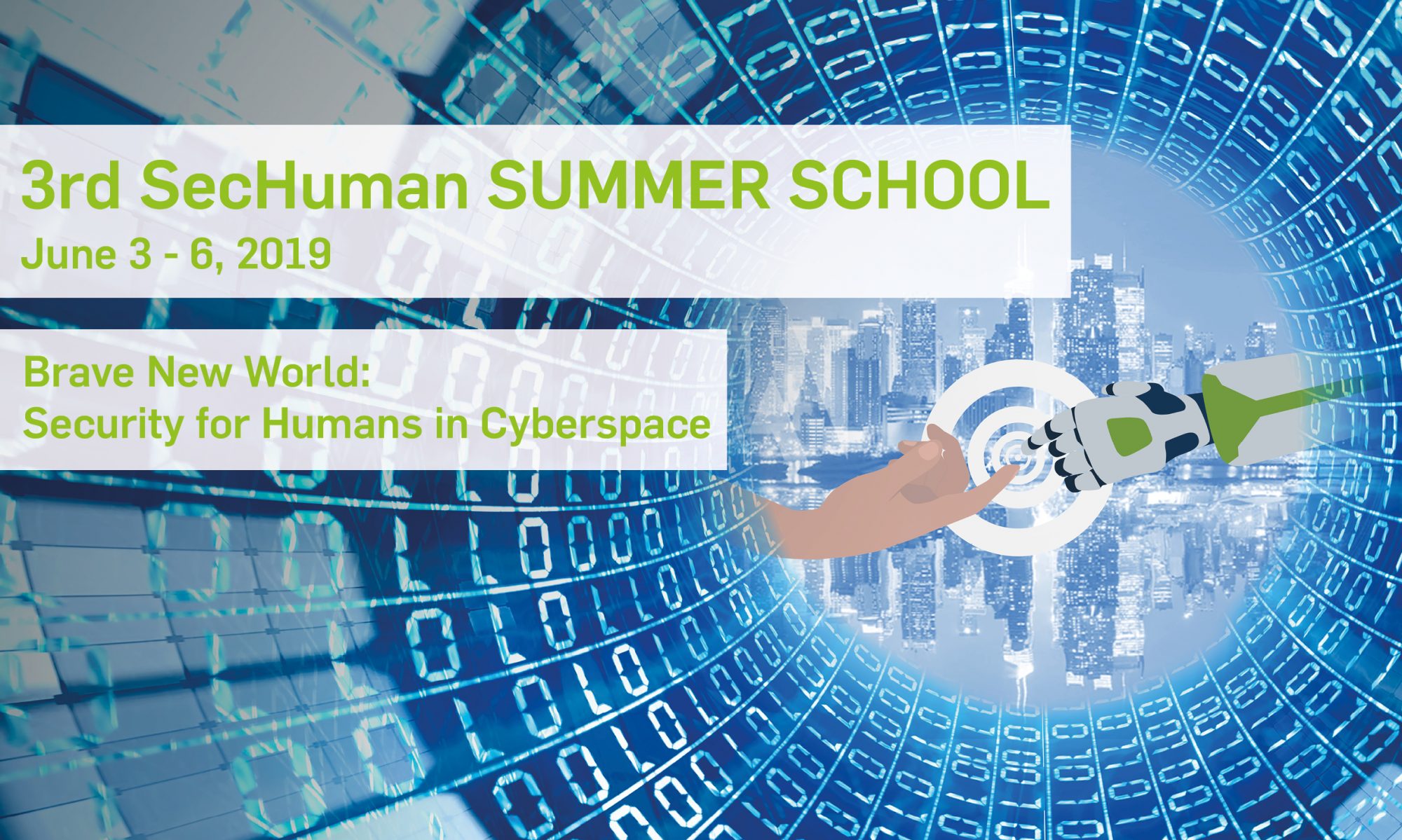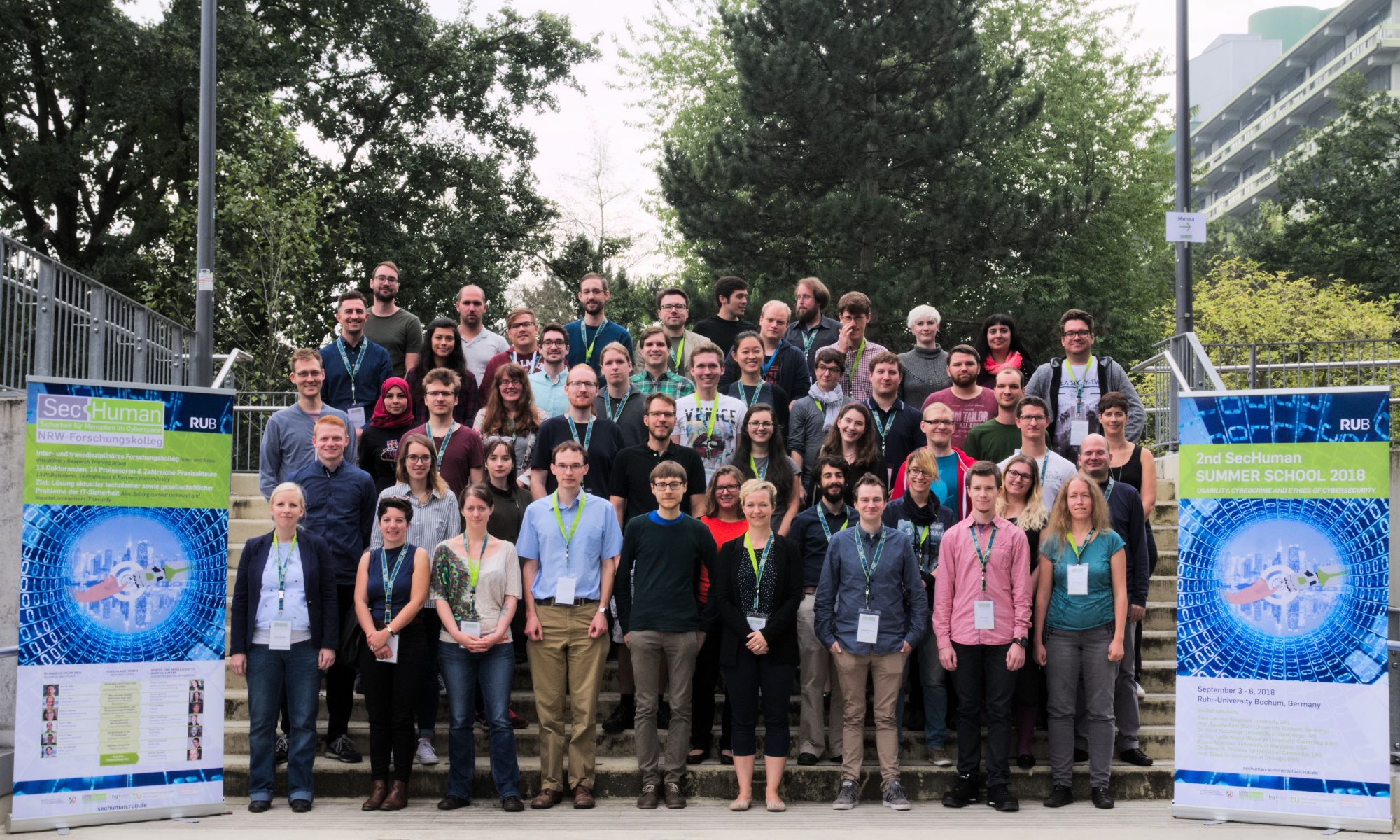2nd SecHuman Summer School „Usability, Cybercrime and Ethics of Cybersecurity”
September 3-6, 2018, Ruhr University Bochum, Germany
From 03 to 06 September 2018 the 2nd SecHuman Summer School „Usability, Cybercrime and Ethics of Cybersecurity“ took place at the Ruhr-Universität Bochum. 45 international participants from England, Ireland, the Czech Republic, Belgium, Luxembourg, Austria, the USA and Germany and the 7 international speakers exchanged their views on the topic of cyber security across a wide range of disciplines for 4 days.
Prof. Dr. Nikol Rummel (institute for educational science, Ruhr-Universität Bochum, G) welcomed the participants with a keynote speech. Then four very informative Summer School days with top-class scientists started. Prof. Sascha Fahl (Ruhr-Universität Bochum, G) showed with the first lecture how it is possible to close the gap between theoretical security and real privacy by considering human factors in the field of IT security.
Blase Ur (University of Chicago, USA) was able to show how to create better passwords and sensitize users to how online behavior can be used through tracking to create personalized advertising for the user.
Day 2 of the Summer School was all about psychological aspects and methods of usable security. Lydia Kraus (Masaryk University, CZ) and Elissa Redmiles (University of Maryland, USA) examined the role of intrinsic and extrinsic factors in smartphone security mechanisms and how usable these mechanisms are. Subsequently, the question arose whether usability can be measured and which (economic) methods are available.
Daniel Thomas (University of Cambridge, UK) and Alice Hutchings (University of Cambridge, UK) devoted an entire day to the topic of cybercrime. How much damage does cybercrime do? Security vulnerabilities were examined in group work and the question of when to disclose them was discussed. An insight into black market machinations using airline tickets as an example gave participants a different perspective on cybercrime.
The Summer School ended with two very informative lectures on „Research Ethics“. Just because something is legal doesn’t mean it’s ethical. The participants looked beyond their own research and asked themselves fundamental questions that arise when studying IT security or cybercrime.
The program was rounded off with a conference dinner on the campus of the Ruhr-University in Q-West, a guided tour through the Fiege brewery and an optional visit to the planetarium.
The participants were more than satisfied with the interdisciplinary exchange:
„The SecHuman summer school was a brilliant networking and learning experience for me. I met researchers interested in my specific area and those from other disciplines that someday I hope to collaborate with. The summer school offered a very friendly and vibrant environment for meeting new people and enthusiastically discussing all things security. I would absolutely recommend this to all early career usable security and privacy researchers. Thank you again for a brilliant week.“ Hazel M., Maynooth University, Ireland
„The summer school aporoached the human aspects in security from multiple directions, creating a diverse program broadening our view of the subject.“
Martin Ukrop, Masaryk University, Czech Republic
„I found the SecHuman Summer School to be a fantastic opportunity to meet other PhD students, talk about ideas, share practice and hear from experienced researchers who already have been where we want to go. I would highly recommend applying.“ Arianna S.
2nd SecHuman Summer School 2018
1rst SecHuman Summer School 2017: Usable Security and Privacy
31. July – 3rd of August, 2017, Ruhr University Bochum, Germany
The Summer School addressed young researchers with an interest in interdisciplinary questions in IT security. Leading authorities in the field of human factors in security provided an overview of this growing area and introduced to current research topics. The Summer School presented a unique opportunity to meet fellow researchers with various backgrounds including technical disciplines, but also from other areas including law, linguistics, journalism, media science, education as well as social science. Over the course of four days, issues related to usable security were discussed. The last day was dedicated to privacy issues. The lectures were accompanied by discussion groups and exercises, which provided an opportunity to gain a more in-depth understanding and to relate to one’s own research interests.

